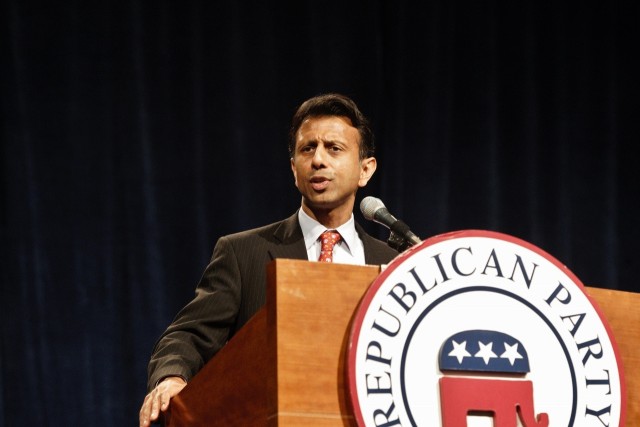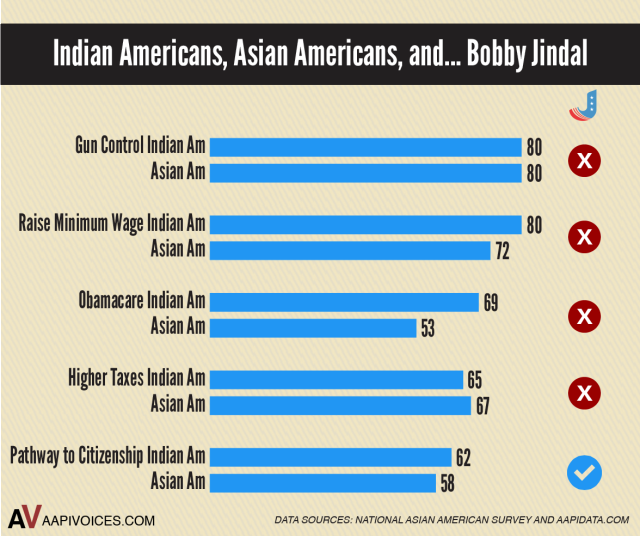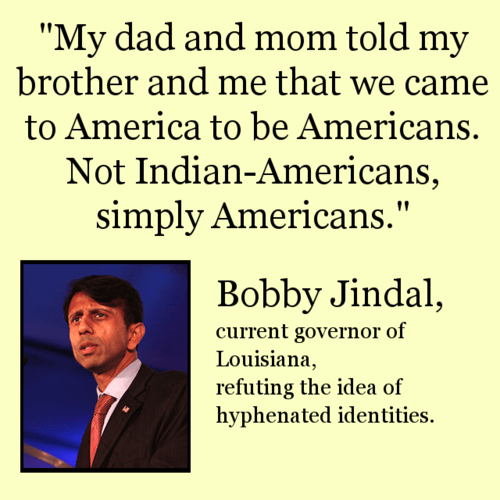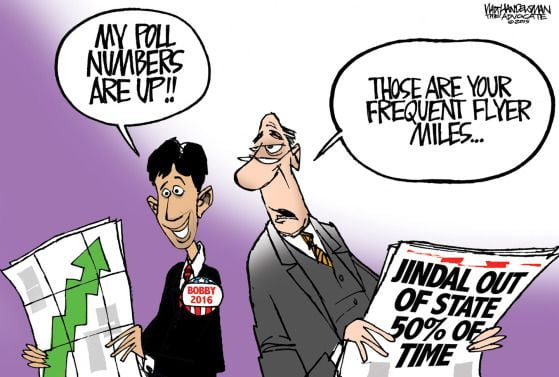The U.S Presidential elections are not my concern. Not particularly, at least. As an outsider, I could care less about the politics of any candidate, whether they are Democrat or a Republican, a New Yorker or a Redneck, White or Hispanic. That is, unless of course their vision of foreign policy is bereft of what my country and the world expects of the global superpower. It even helps sometimes when the said election is interesting, and even entertaining (Donald Trump, anyone?). What actually does pique my interest this year however, is the contention of a certain Bobby Jindal in the race to become the 45th President of the United States.
Bobby Jindal. Incumbent Governor of the Southern State of Louisiana and one of the many, many, many Presidential candidates of the GOP. A graduate of Brown and a Rhodes Scholar, Bobby Jindal was, and still is one of the most accomplished men to hold public office in the U.S. He is also, among other things growing in stature as a rabble-rousing, right-leaning, god-fearing maverick in charge of a State, which is probably best known for its role on True Detective, a downward spiral best described by his polling projections (Which is, to be frank is its own form of entertainment).

The story of Bobby Jindal is a fairytale gone wrong, an American dream that has slowly turned into a nightmare. Born to Hindu, Indian immigrants, Jindal was the first non-white person elected to run a State as Governor, Louisiana no less which we all know is a byword for racial hostility and parochialism. He is suave, confident, spontaneous and by all accounts, eerily straightforward. He is, simply put, the anti-thesis of most Indian-Americans and is, the best representative of the Indian-American community in the United States.
And yet surprisingly, of late he has rankled the feathers of many, especially Indian-Americans. The same commune of people who had been so proud of him and had embraced him as one of their own in 2007 and later 2012, have now suddenly spurned Jindal as an outcast. The small fortune and huge donations that Jindal was used to from the community as Governor, have dried up gradually.
Now, anyone who knows Indians personally will testify to the fact that we are very proud of anyone remotely Indian, whether we had a contribution to their making or not. Sunita Williams was one such person, Bobby Jindal is another. We, as Indians are always taking credit for the achievements of others who have had no help or contribution from any of us. The fact that these individuals are not even Indians but were naturalized foreign citizens is beneath us and all that matters for many of us is that they are ‘ethnically’ Indian.
And, Bobby Jindal’s critics are not territorial and limited to the United States, but have instead taken root in India as well. He has stayed aloof, and even contrary to the general consensus on many issues concerning Indians, immigrants or otherwise such as immigration rights, gun control, digital outsourcing, school prayer or pro-choice mandates. He has hardly participated in community festivals and instead goes on to berate these fests as un-American. Sometimes, it’s a wonder to imagine what meds he is on when he confidently speaks about supposed ‘No-go zones’ in America. In a significant divergence, whereas most Indians place themselves somewhere right of centre, his almighty lean towards the conservative right has now inexplicably placed him to the right of his own party. Which is why most of the Indian-American community which had as a representative of their community supported Jindal’s cause (Across party lines, as most Indian-Americans are Democrats), has suddenly abandoned him, accusing him of ‘letting go of his heritage.’

‘Letting go of heritage?’ That is a dilemma I’m certain beholds every immigrant or newly naturalized citizen of the United States. How much is enough? How long can one hold on to their native identity? This is a sociological conundrum that has, and shall always pose difficult questions for all generations to come. This is a question of assimilation against ethnocentrism.
As Shashi Tharoor smartly puts it, Bobby Jindal is an assimilationist’s dream. Whereas some immigrant communities try their best to maintain a certain degree of their cultural sanctity by holding on to their native identities, especially in speech, food or preferences, there are others who want nothing more than assiduously merge into the living, breathing American fabric. Whereas most such communities, usually first and second-generation immigrants have held on to their often ethnocentric attitudes, people like Jindal have embraced the cosmopolitanism of the American dream.
And no, I’m not saying that is a bad thing. Assimilation is, to a varying degree a prerequisite to living among new people, in a new world. It is, to put it into perspective, the very idea behind the Melting Pot theory, which ironically enough, was coined as against the movement of immigrants to the United States. Governor Jindal, I suspect has embraced this very homogeneity, this ‘common culture’ that grows from assimilating under the Melting Pot theory. Oddly enough, considering the fact that Jindal was born a naturalized citizen of the United States, an American over and above his obvious ethnic roots should not even raise the question of identity, heritage and assimilation. And yet, it has. And the way I see it, there is nothing wrong with it. Not much, anyway.

Is Bobby Jindal letting go of his heritage? That is not for me to say. But, what I can say however is that the arguments answering in the affirmative are faulty and even, silly. Jindal’s assimilation, whether it is his conversion to Catholicism or his insistence on being called ‘Bobby,’ an American name, was well before his political foray. Therefore, unless he had made up his mind to run as Governor and the President of the United States in High School, I’d say that any criticism of these instances is misguided, and is made merely for the sake of argument. In fact, I’d bet anyone who accuses Jindal of being opportunistic and converting to Christianity will be convinced otherwise after reading his writings on demonic possession and exorcism in the New Oxford Review (Sincerely written but again, they are a hoot).
Secondly yes, many do have an issue with his sustained detachment and uncertainty against many Indian issues. And that is understandable. But, on Bobby’s part, it makes even sense. Dissociating himself from a loyal albeit, small community of first and second generation immigrants allows him to cater to the larger community of well-off, conservative whites who make up most of Louisiana and a significant chunk of the electorate across the U.S. And considering his pitiable polling projections, I cannot blame him for trying.
Trying, yes. According to unanimous estimates, Jindal’s chances in the 2016 Presidential election are second to none, and downright non-existent. It would seem that Bobby Jindal’s risky political calculation of pandering to the right has not worked. Instead, he is handicapped by a host of GOP candidates, all of whom are placed at the right of the already right-headed Republican Party. Additionally, for all his education and suaveness, Jindal has been oddly trite and bombastic with his campaign, sounding vaguely incoherent and dishonest even.
The year ahead for Piyush Bobby Jindal is as unclear and unknown as it is for the rest of us. However, if the current trend is anything to go by, he’s certainly not doing well (Not enough for the GOP debate next month). As it stands today, Jindal is viewed by many as a ‘brown man masquerading as a White supremacist.’ And as racist as that sounds, there may be some fire to this smoke. After all, unless the artist is blind, I can never explain why a Bobby Jindal portrait was several shades lighter than his actual complexion (#BobbyJindalSoWhite was trending too). Whatever the case or strategy may be, his contention in the race may have crashed and burned even before it took off. In fact, as some speculate, Nikki Haley, the other American governor of Indian origin has a better chance as a VP probable to counter-balance Hillary on the Democrat ticket (Good luck with that).

It is not up to me, or anybody to judge whether Bobby Jindal is ‘Indian’ enough. We, as a people on one hand take pride in the achievements of those in which we had no part in and on the other, we find ourselves offended when the said people supposedly depart from their ethnic roots. That is perhaps, one of those quiet idiosyncrasies of being an Indian. As Shashi Tharoor so well puts it yes, we must be proud of how far a brown skinned man by the name of Bobby Jindal has come in American politics. However, we do not have the right to take credit for it, and all that he has achieved nor what he stands for or for how he behaves. He may have Indian ancestry, but he is not. He burnt that bridge a long time ago. No, he is as American as anyone. And that’s okay.
This entry is part of Fair Observer’s YouLead 2015.

































